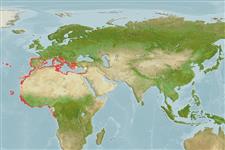>
Kurtiformes (Nurseryfishes, cardinalfishes.) >
Apogonidae (Cardinalfishes) > Apogoninae
Etymology: Apogon: Greek, a = without + Greek pogon = chin, beard (Ref. 45335).
More on author: Linnaeus.
Environment: milieu / climate zone / depth range / distribution range
นิเวศวิทยา
เกี่ยวกับทะเล,น้ำเค็ม เกี่ยวกับหินโสโครก; ไม่มีการอพยพย้ายถิ่น; ระดับความลึก 10 - 200 m (Ref. 4738). Subtropical; 45°N - 5°S, 32°W - 36°E
Eastern Atlantic and Mediterranean Sea: Portugal to Morocco and the Azores. Elsewhere, southward to Gulf of Guinea.
ขนาด / น้ำหนัก / Age
Maturity: Lm ? range ? - 5.5 cm
Max length : 15.0 cm SL เพศผู้/กระเทย; (Ref. 4738); อายุสูงสุดที่ได้รายงาน: 5 ปี (Ref. 93355)
เงี่ยงครีบหลัง (รวม): 7; ก้านครีบอ่อนที่หาง (รวม): 9-10; เงี่ยงครีบก้น 2; ก้านครีบอ่อนที่ก้น: 8 - 9. Eye very large, much greater than snout. Pectoral fin long, reaching at least origin of anal fin. Preopercular edge only slightly serrated, preopercular ridge smooth. Body and fins red or pink, back and upper surface of head dusky. Two or three dark spots, sometimes joined, along base of caudal fin.
Occasionally forms schools; sometimes solitary. Inhabits muddy or rocky bottoms and caves (Ref. 4738). A sciaphilous species thriving in a number of shady/dark habitats and frequents marine caves, where it forms large schools (Ref. 118281). Feeds on small invertebrates and fishes (Ref. 4738). Observed to feed in the water column and just over the bottom, always at night; 93.4% of observed events occurring outside the caves, usually on rocky bottoms and Posidonia oceanica meadows, and to a lesser extent on pebbles (Ref. 118281). Oral brooding by males (Ref. 4738).
Males incubate eggs in buccal cavity (Ref. 205, 4738, 74407). Embryos do not feed externally in the buccal cavity. Distinct pairing during courtship and spawning (Ref. 205). Internal fertilization and paternal care by mouthbrooding is found to be a rare combination of reproductive strategy (Ref. 74407). Also Ref. 240.
Tortonese, E., 1986. Apogonidae. p. 803-809. In P.J.P. Whitehead, M.-L. Bauchot, J.-C. Hureau, J. Nielsen and E. Tortonese (eds.) Fishes of the north-eastern Atlantic and the Mediterranean. UNESCO, Paris. vol. 2. (Ref. 4738)
IUCN Red List Status (Ref. 130435)
Threat to humans
Harmless
Human uses
เหยื่อ:
ข้อมูลเพิ่มเติม
อ้างอิงการเพาะเลี้ยงสัตว์น้ำประวัติการเพาะเลี้ยงสัตว์น้ำสายพันธุ์พันธุศาสตร์ElectrophoresesอัตราพันธุกรรมโรคการแปรรูปNutrientsMass conversion
ผู้ร่วมมือรูปภาพหลายรูปStamps, Coins Misc.เสียงปลามีพิษ เช่น ปลาปักเป้าความเร็วรูปแบบการว่ายน้ำพื้นที่เหงือกOtolithsสมองวิสัยทัศน์
เครื่องมือ
Special reports
Download XML
แหล่งที่มาจากอินเตอร์เน็ต
Estimates based on models
Preferred temperature (Ref.
123201): 13.3 - 20.9, mean 16.3 °C (based on 216 cells).
Phylogenetic diversity index (Ref.
82804): PD
50 = 0.5000 [Uniqueness, from 0.5 = low to 2.0 = high].
Bayesian length-weight: a=0.01096 (0.00658 - 0.01826), b=3.11 (2.97 - 3.25), in cm total length, based on LWR estimates for this species & Genus-body shape (Ref.
93245).
ระดับชั้นอาหาร (Ref.
69278): 3.4 ±0.61 se; based on food items.
Generation time: 1.2 ( na - na) years. Estimated as median ln(3)/K based on 1
growth studies.
ความสามารถในการกลับคืนสู่ปกติ (Ref.
120179): ขนาดกลาง, เวลาต่ำสุดที่จะทำให้ประชากรเพิ่มขึ้นเป็น 2 เท่าใช้เวลา 1.4 - 4.4 ปี (K=0.90; tmax=5).
Fishing Vulnerability (Ref.
59153): Low vulnerability (15 of 100).
Nutrients (Ref.
124155): Calcium = 56.5 [28.7, 122.3] mg/100g; Iron = 0.811 [0.475, 1.384] mg/100g; Protein = 19.7 [18.6, 20.7] %; Omega3 = 0.291 [0.167, 0.487] g/100g; Selenium = 18.6 [8.6, 36.2] μg/100g; VitaminA = 54.9 [18.0, 172.0] μg/100g; Zinc = 1.05 [0.67, 1.59] mg/100g (wet weight);
